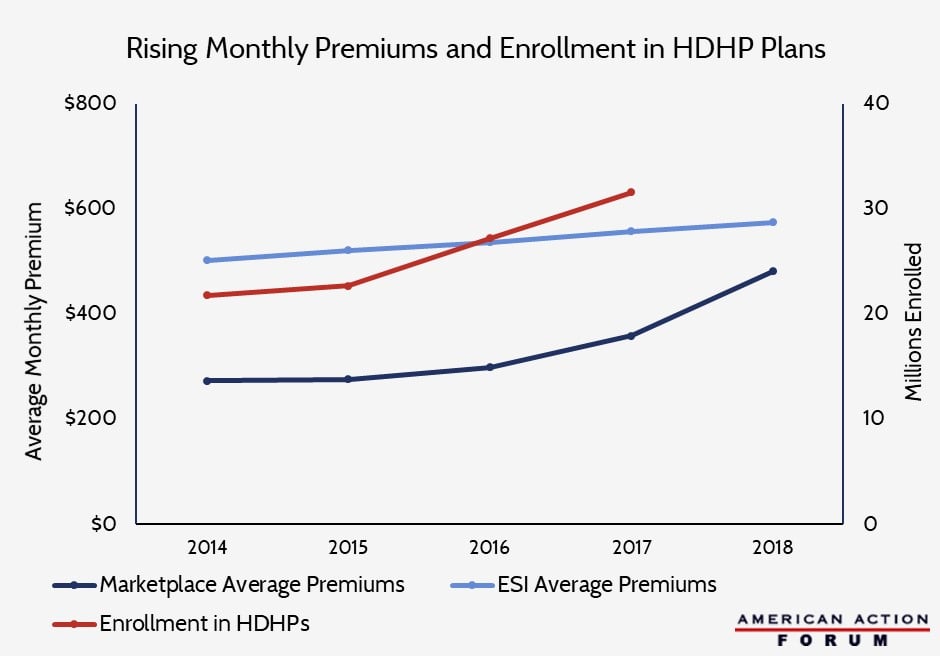Weekly Checkup
March 27, 2020
The Affordable Care Act Turns 10
This week was all coronavirus all the time. But something else happened as well, and we would be remiss here at the Weekly Checkup if we didn’t mark it: the 10th Anniversary of the Affordable Care Act (ACA).
I feel something of a personal connection to old Obamacare. The legislative march toward its enactment and the policy disputes surrounding its implementation have defined my professional life. I worked in the House and Senate during the ACA’s consideration, and even submitted one of the first requests to the House legislative counsel’s office to draft one of what would ultimately be, oh, several gazillion bills aimed at repealing the law.
I arrived at the American Action Forum in late Spring of 2013, just in time to document the ACA’s catastrophically bad rollout. I’ve spent literally a decade debating the relative importance and effectiveness of the individual mandate. I’ve seen premiums and deductibles spike, and the uninsured rate drop. I’ve tracked year-over-year increases and decreases in plan offerings. I’ve been party to repeal efforts as well as replace efforts. I’ve watched two and a half challenges to the law’s constitutionality make their way to the Supreme Court. I’ve noted impending death spirals in the health insurance marketplace, as well as its stabilization in recent years. Most recently I’ve pontificated on the Trump Administration’s efforts to provide more choice and flexibility in insurance options for consumers within the confines of the law’s numerous restrictive mandates.
After all that, I have reached one inescapable conclusion: Folks, it’s time to move on. I can’t believe I’m about to write this, but the ACA is the law of the land. Barring a truly surprising and game-changing ruling from the Supreme Court in Texas v Azar sometime next year, the ACA is here to stay. And to my conservative, free-market promoting compatriots I say, that’s ok.
Hear me out. For too long we’ve been stuck in a never-ending battle over repeal and replace. The problem with this paradigm has been twofold. As a matter of legislative mechanics, unwinding the ACA from federal statute has proven to be next to impossible. But engaging in that battle has also been self-defeating for those seeking to inject market forces, choice, and competition into the American health care system.
The political reality is that any effort to repeal the ACA has had to be tied to a replacement plan, which means conservatives have been forced to develop massive reforms to the health system that somehow deliver every popular benefit provided by the ACA. In effect, the need to deliver on promised repeal has forced conservatives to push a series of broad legislative efforts that have been branded—not entirely unfairly—as Obamacare-light. Ultimately, efforts to move our health care system in the direction of free-market competition fall apart because they either haven’t been “full-repeal” or they’ve been too complex to clear the legislative hurdles. The Trump Administration tried this standard repeal-and-replace approach in 2017, with predictable results. Since that repeal effort, however, the president and his administration have taken a narrower approach, using executive power to make market-friendly changes to the law where statute allows.
The way to move forward on health care policy for conservatives is to accept where we are, move on from efforts to remake the system in one fell swoop, and embrace an incremental approach to moving the health care system in a better direction. We aren’t going to repeal Obamacare, but we can change it.
Now, if you came here today looking for my take on the Senate’s Coronavirus Aid, Relief, and Economic Security (CARES) Act, you can find that here. While you’re there, be sure to check out the American Action Forum’s COVID-19: Impact and Response page, where all of our recent analyses of the federal response to coronavirus are curated for your convenience.
Chart Review: Rising Monthly Premiums and Enrollment in High Deductible Health Plans
Josee Farmer, Health Care Policy Intern
The Affordable Care Act (ACA) turned 10 years old on Monday, March 23rd. Since the ACA’s Marketplace became available in 2013, premiums across the board have increased substantially – the average benchmark premium for an individual with a Silver plan through the Marketplace increased from $273 a month in 2014 to $481 a month in 2018, a 76 percent increase. A recent American Action Forum study found that the change in premiums slowed after 2018 but greatly differed by rating area – a one percent average increase in 2019 and a 3 percent average decrease in 2020. Non-Marketplace insurance saw an increase in premiums as well, as the average premium for an individual with employer-sponsored insurance increased from $502 per month in 2014 to $575 in 2018. During the same time frame, enrollment in high deductible health plans has also dramatically increased – a total of roughly 21.8 million enrolled in 2014 versus an enrollment of roughly 31.6 million in 2017. The increase of almost 10 million can be attributed to the ACA: As the law made coverage requirements more rigid, all that separated plans were their differing premiums and deductibles. With average premiums rising, a growing percentage of individuals have opted into plans with lower premiums but with higher deductibles instead.
Premium data obtained from KFF for ESI and Marketplace Silver Benchmark Premiums; HDHP enrollment data obtained from CDC and Shadac State Health Compare
From Team Health
How the CARES Act Responds to the COVID-19 Public Health Crisis – Director of Health Care Policy Christopher Holt
The health provisions in the CARES Act fall broadly into three buckets: those related to the pandemic, those only indirectly related, and those not related at all.
COVID-19: Impact and Response
All of AAF’s analysis on the pandemic and the federal government’s response can be found on this organized dashboard.
Worth a Look
Kaiser Health News: Hospital Suppliers Take To The Skies To Combat Dire Shortages Of COVID-19 Gear
Health Affairs: National Health Expenditure Projections, 2019-28: Expected Rebound In Prices Drives Rising Spending Growth











